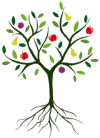Dabinett
Malus domestica Dabinett is a classic English cider apple variety, which produces a "bittersweet" juice. It is also one of the most reliable and easy cider varieties to grow.
Whilst most ciders are created by blending different varieties, Dabinett can also be used to produce a single-varietal full-bodied medium-dry cider. It is therefore a good choice if you are only planting one or two cider trees.
Note that Dabinett apples are not suitable for eating fresh, they can only be used for producing apple juice and cider.
Dabinett cider apple trees for sale
RF11-year bare-root
tree
on M116 rootstock£34.95
Mature height: 2m-3.5m after 10 years
Can be grown on as a large free-standing apple tree, a small half-standard apple tree, or a large apple fan or espalier. Available next season
RF22-year bare-root
tree
on M116 rootstock£43.00
Mature height: 2m-3.5m after 10 years
Can be grown on as a large free-standing apple tree. Available next season
RF31-year bare-root
tree
on MM106 rootstock£34.95
Mature height: 3m-5m after 10 years
Can be trained on as a large free-standing apple tree, a half-standard apple tree, a large apple fan or espalier, or a pleached apple tree. Available next season
RF41-year bare-root
tree
on MM111 rootstock£35.75
Mature height: 3m-5m after 10 years
Can be trained on as a large free-standing apple tree, a half-standard apple tree, a large apple fan or espalier, or a pleached apple tree. Available next season
RF52-year bare-root
tree
on MM111 rootstock£43.00
Mature height: 3m-5m after 10 years
Can be trained on as a large free-standing traditional apple tree. Available next season
RF61-year bare-root
tree
on M25 rootstock£35.75
Mature height: 5m-7m after 10 years
Can be trained on to produce a big 'standard' free-standing apple tree in a traditional apple orchard. Available next season
Growing and Training
Dabinett is one of the most reliable cider varieties, with above average disease resistance.
The flowering data for Dabinett is quite variable, suggesting that local microclimates can have a big effect on it. It is basically a late-flowering variety, usually from the middle to the end of May. Fortunately it is reasonably self-fertile.
Dabinett is also a precocious variety, with fruit produced from a young age.
Recommended pollinators for Dabinett cider apple trees
Dabinett is self-fertile, so you do not need another variety to pollinate it to produce fruit.
However you are likely to get a better crop if you plant any of the following pollinator varieties nearby.
If you are not sure about pollination requirements don't hesitate to ask us.
More pollinators >
Somerset RedstreakAn English cider apple variety producing a very high-quality bittersweet juice.
Yarlington MillYarlington Mill is a traditional English cider apple variety producing a bittersweet juice.
Golden HornetMalus Golden Hornet is a traditional white blossom crab apple, with persistent yellow fruits.
Brown's AppleBrown's Apple is a traditional English cider apple variety producing a sharp juice.
Comtesse de ParisComtesse de Paris can be considered as an improved Golden Hornet. It features the same white blossom and persistent yellow fruitlets, but grows with a better form.
Red FoxwhelpRed Foxwhelp also known as Herefordshire Redstreak, is an old English cider apple variety which produces a dull red bittersweet juice.
Tremlett's BitterTremlett's Bitter is a traditional English cider apple variety producing a bittersweet juice.
History
Dabinett originates from the traditional cider region of Somerset, England in the mid-19th century. It is possibly a seedling of Chisel Jersey.
Dabinett characteristics
- Gardening skillBeginner
- Fruit persistenceFruit drops when ripe
- Self-fertile?Self-fertile
- Pollinating othersAverage
- Pick seasonVery late
- Picking monthOctober
- Picking periodlate October
- Keeping2-3 weeks
- Food usesHard cider
- Country of originUnited Kingdom
- Period of origin1850 - 1899
- Fruit colourRed - dark
You might also like these varieties
Kingston BlackKingston Black is one of the premier English cider varieties and produces a bittersharp juice.
MichelinMichelin is a traditional French cider apple variety producing a bittersweet juice.
Yarlington MillYarlington Mill is a traditional English cider apple variety producing a bittersweet juice.
More about cider apple trees
In the west of England, and across the Channel in north-west France, there is a long tradition of brewing cider using dedicated apple varieties. These apples are usually full of tannins, which makes them too astringent for eating fresh ... but it is these unpaltable tannins which give the 'body' which is so essential in traditional cider.
If you are serious about making your own cider then you'll probably need quite a few cider trees. As a rule of thumb, you'll need about 2kg-3kg of apples to produce 1 litre of apple juice. A big old traditional cider apple tree might produce 80kg - 160kg of apples, while a more manageable semi-vigorous tree might give you up to 50kg of apples.
